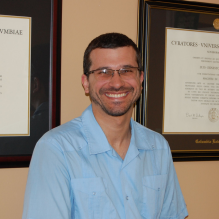Buffalo Criminal Law Center puts scholars in touch worldwide

Professor Luis E. Chiesa, director of the Buffalo Criminal Law Center.
Published October 10, 2013 This content is archived.
“A robust exchange of ideas” is the guiding principle behind an ambitious series of initiatives planned by the Buffalo Criminal Law Center, SUNY Buffalo Law School’s platform for in-depth study of U.S., international and comparative criminal law.
With Professor Luis E. Chiesa, an internationally recognized scholar of criminal law, as its director, the BCLC is planning academic events, hosting visiting scholars and making it possible for academics worldwide who work in this subject area to interact and converse.
“We want to foster a conversation between not only Europe and America, abut also between America and Latin America, as well as America and Asia,” Chiesa says. “These are places where developing countries are hungry for ideas regarding how to better their legal system in general and their criminal justice system in particular. They really want to exchange ideas and to learn from each other.”
SUNY Buffalo Law School offers J.D. students a concentration in criminal law and also has a master of laws program in criminal law. Drawing on this core strength in criminal law, and building on the center’s early efforts led by former Professor Markus Dubber, the BCLC is concentrating its efforts on three initiatives.
The center’s Colloquium Series and Conferences will bring leading criminal law scholars to Buffalo to present works in progress. In the Colloquium Series, invitees are physically present at the Law School and present to Law School faculty. In addition, a rotating roster of 16 criminal law scholars worldwide will participate by Skype.
“This is an incredible opportunity for scholars to be able to present their work to a wide variety of colleagues,” Chiesa says. “We have to think deep and hard about the problems of the criminal justice system and how to solve them, flag new issues and come
up with new ways of thinking about old issues. Part of the job is to keep ourselves up to date regarding what’s out there. Hopefully, hearing about what others are doing and writing about will be helpful to our own projects. This is sort of a virtual community.”
The center will also sponsor more traditional conferences, in which academics gather in person to present and discuss around a central topic. A conference planned for spring 2014, with a topic yet to be determined, is expected to produce papers that will be published as a book or in the Buffalo Law Review. Participants will include scholars from Spain, Germany, Latin America and the United States.
The BCLC Visiting Researcher Program invites international scholars with an interest in U.S. criminal law to be in residence at the Law School for one to six months. There they will conduct research and talk with Law School faculty and other scholars. Besides the Law School’s excellent research facilities, Chiesa notes, it’s important for academics from other countries to be able to watch the U.S. justice system in action and to learn about its nuances from practitioners.
Finally, the Comparative Criminal Law Conversations Project will foster critical conversation between scholars in civil law jurisdictions, such as continental Europe and Central and Latin America, and those working in common law traditions such as Great Britain and the United States. In an unprecedented project, the BCLC is spearheading an effort that will feature English translations of four or five seminal German and Spanish works in criminal theory, followed by replies written by leading Anglo-American scholars.
All of these will be translated into English, with publication expected to follow in early 2015. The goal, Chiesa says, is to help scholars bridge the gap between the civil law and common law traditions.
2013 marked the publication of the second edition of Professor Luis Chiesa’s 300-page hornbook on substantive criminal law, Derecho Penal Sustantivo (JTS Publishers), written in Spanish for readers in the author’s native Puerto Rico.
The second edition was made necessary by changes in the commonwealth’s legal code. The first edition was cited as “Best Legal Book” by the Puerto Rico Bar Association, and it has been cited at least 10 times by the Puerto Rico Supreme Court and 25 times by the Puerto Rico Court of Appeals.